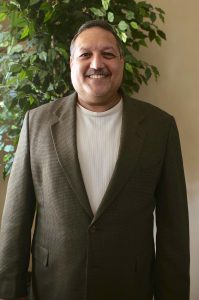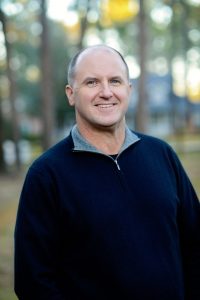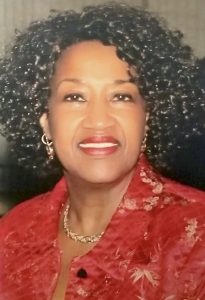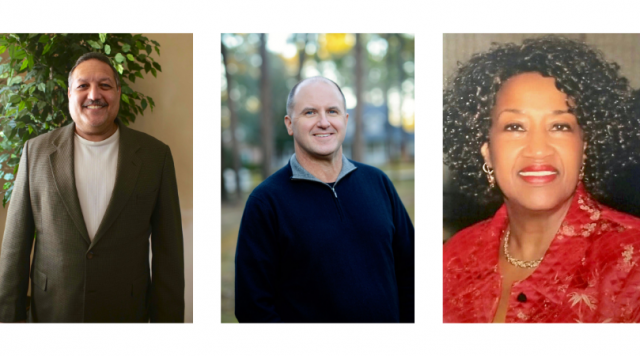Asylum seekers, lawyers, politicians, and aid workers have spoken of alarming conditions faced by some detained migrants at some facilities along the Texas border: sick children not receiving medicine, toddlers representing themselves in court, spoiled food, overflowing toilets. Others, including some detainees, say conditions are livable and clean, and food is plentiful.
Reports seem to differ greatly between facilities, and while the number of people crossing the border rises and falls, it’s not stopping: last month, nearly 40,000 migrants were apprehended along the state line.
Last month, a pastor in Henderson, 30 miles east of Tyler, organized a “fact-finding trek” to Brownsville, Texas, to see how detained migrants were faring there. Over 100 pastors from different Texas communities—including Henderson and Longview—joined the travel, and the group plans to visit Washington, D.C., later this month to lobby Congress about their findings.
We wanted to learn about how people of faith here in Tyler, including religious leaders, are thinking and talking about the migrant crisis. Are they speaking about border conditions at their services? Has their faith moved them to act on this issue in any way? Why or why not?
In our first installment of this series, we hear from Gilberto Avila, pastor of Una Nueva Creación Church; Fritz Hager, Jr., executive pastor of Bethel Bible Church; and Beverly J. Russell, member of Grace Community Church and the Tyler Together Race Relations Forum. Our conversations have been edited and condensed for length and clarity.
Do you consider yourself a community leader in Tyler and someone who is deeply guided by your faith or a set of ethical guidelines? Would you like to share your perspective on how your convictions influence the way you think—or act—related to the border crisis? Please get in touch.
Gilberto Avila
Gilberto Avila is the pastor of Una Nueva Creación Church in downtown Tyler. Originally from Puerto Rico, he is the president of the Evangelical Hispanic Ministerial Alliance of East Texas.

“We need to do something, but [my church] isn’t sure what we can do. I was just having a prayer meeting with some members from my church, and we were praying about what to do.
One thing Hispanics can do is share their story. One of the things I say on Sunday at church is we need to start sharing our story. A lot of people have it wrong about us. We’re just people. We just want to have better opportunities for our children. Hispanics need to start talking so we can be better understood.
You can’t do too much at the border. You might be able to help some people by passing out food, but really if we want to help people, we need to start letting our voice be known. If we are going to help people, we need to talk, we need to share our stories. Really to help solve the issue we need to share our voice, talk to our friends who think differently than us, to change people’s opinions about us, so that will be reflected when they vote.
Right now it’s very hard for Hispanics to help at the border, because you know what? The government has done a great job—Hispanic people are scared. Even people who are not citizens, but have legal status [through DACA or other means], are scared that they are going to lose their legal status if they help.
So you have a Hispanic community that is suffering paralysis because they are scared. You tell them, ‘Let’s go help people,’ and they say, ‘We don’t want to go out. You never know what’s going to happen, we might find ICE on the way.’ They are scared, and it’s very hard to move people when they are scared, because they don’t know what’s going to happen to them. If they are deported, what’s going to happen to their kids?
One of the reasons the nation is in crisis is because our faith is in crisis. With Jesus, everyone is welcome. He broke down barriers between the Jews and the Gentiles. But today, even our faith is divided into colors. Our faith should dictate our thoughts, but sometimes politics does instead.”
Fritz Hager, Jr.
Fritz Hager, Jr., is the executive pastor of Bethel Bible Church in Tyler. He serves as a regimental chaplain in the Texas State Guard and a trustee for the Tyler ISD school board.

“Biblically, it’s a complex issue. I’ve wrestled with how to respond. The challenge of being a pastor and trying to authentically live out the faith is to try to take into account the whole counsel of God. That means not finding one verse that justifies your action, but to look at everything that Scripture says about a particular issue.
On one hand, the Bible says ‘Love your neighbor,’ which we should. And that we should care for the sojourner or the foreigner. So to some people, this is a clear-cut issue. And yet, you have Romans 13, which says that the government is established to promote good, and discourage bad, and provide order. Governments are given the responsibility to protect their borders. So there’s not a single verse that I look to that makes me say ‘Oh, I read that, and therefore I know how to solve this issue.’ It’s really ‘How do you hold all these issues in tension in a way that strives to consider the whole counsel of God?’
Romans says that our leaders are appointed by God. It doesn’t mean that government is without criticism. It also says that [governmental leaders] are there to promote the good. So to the extent that they are not promoting good, I think it’s fair for Christians to object.
We are ministers of reconciliation. So we can’t take the attitude that we don’t care what happens in the world, because we know that it’s not going to get sorted out until Jesus comes back. We have a role to play here as His ambassadors and His representatives until He decides to come back.
[Bethel Bible Church] has a ministry to immigrants in Greece. We have sent teams over there for the last three years. There’s so much need in the whole big wide world—you can’t be everywhere. We are looking for ways to work alongside somebody who is there [at the Texas border], but we haven’t chosen a partner at this point.
Our downtown campus [has more young people], college-age and millennial. They are more likely to have political debates. Our south campus is fairly homogeneous. This is the place to come if you are a young family with kids. They are predominantly white and predominantly live in the south side of Tyler. The Hope campus [in North Tyler], which is a mix of African-American, white, and Hispanic, I hear them talking about these issues.
As a person of faith, yes, I want laws to be just and to promote the good. I care about people because they are created in the image of God, and because of that are granted dignity and worth, regardless of where they are from or the color of their skin. I care about—and the Bible cares about—families. I want intact families here in Tyler, Texas. I want divorce rates to go down; I want people to decide to get married before they have kids.
At the same time, I don’t like seeing families who have chosen to come to this country pulled apart, particularly ones who are following the law, which allows them to present themselves at a point of entry and ask for asylum. In my mind, that person is still a legal immigrant. It’s only when they fail to appear to immigration hearings that they then become illegal. But I know, from the little bit of research that I’ve done, that the backlog is a huge part of the issue.
Neither side politically has made any real effort to solve the problem in any sort of comprehensive way. Open borders is not the answer; I don’t think that’s Biblical either. At the same time, ratcheting up the punishment to a level that seems disproportionate, to discourage people who are hurting and suffering and want to come to our country, that doesn’t seem like a good approach either.
As a chaplain in the state guard, one of the things we do is run shelters for people who are displaced by natural disasters. Two years ago, we were down in Harvey setting up shelters. I empathize with the government in terms of how challenging it is. If someone were trying to discourage people by doing a poor job of responding [to a crisis], that would not be consistent with treating folks with the dignity that they deserve as image-bearers of God.”
Beverly J. Russell
Beverly J. Russell served as an officer in the U.S. Air Force and as a prosecutor in New York City. Now retired, she attends Grace Community Church and is a member of the Tyler Together Race Relations Forum.

“There are people with children arriving at our borders looking to America as a place of freedom and opportunity, and yet being treated awful at our borders. The cruelty of it upsets me. Jesus certainly wouldn’t stand by. He was a radical back in the day. I envision Him as someone who protests—an activist. He would not stand by idly as you rip children from their parents and are so callous that you don’t even bother to think to have a system in place that connects these children back to their parents. What my faith will not let me tolerate or condone is the inhumane treatment of people, period.
Let me be clear: in my conversations with believers, we’re not all in consensus. People of faith, generally, don’t agree on this issue.
This question of legality seems to be where some Christians fall. I was a prosecutor, so I understand the law. The go-to position for most people, even people of faith, is ‘Well, it’s illegal to cross the border.’ I get that there are laws against illegal immigration, and that you should go through the legal process. That’s one issue. Where my faith kicks in is, ‘These people arrive. Now how do we treat them now that they’re here?’
I was at Bible study with a friend who disagrees with me, and I said, ‘Well, what would Jesus do?’ At that point, she just got quiet. We’re still cool; we’re dear friends.
The teachings on Sunday of love and unity are universal. It doesn’t matter what issue we’re talking about. You can’t say the lesson on ‘Loving your neighbor’ doesn’t pertain to our neighbors from the south.
Should people in the pulpit be confronting people directly on that? I can’t answer that for people in the pulpit. I’m sure they struggle with the various positions that people have, in all fairness.
I would think churches would be out marching, saying ‘Yes, there are laws, but you, government, figure out those laws and treat these people humanely.’ Pastors from various faiths [could say]: ‘We want to go in and inspect these centers. We want to go in [to detention centers)] and maybe start having Bible study with these people. Yes, we are a land of laws, and we want those laws to be respected, but we are God-fearing people.’
I’m African-American. In my ancestors’ experience, the law worked against us. So I’m very much in tune with the immigrants’ plight. I can’t speak for all churches, but imagine how [divided] churches were back during the time of slavery.
Families are being divided on this topic. Some people have the attitude of, ‘I don’t want to talk about that at the dinner table, because I know how my brother feels, and I don’t want to [cause a scene.]’ And I think that’s how it is at a lot of churches. I’m not trying to be critical of churches. Generally to me, one of the weaknesses in humans is, how many people stand up for their beliefs, regardless of whom it makes them contentious with? Jesus died for His belief. Who else is willing to do that?
I wouldn’t be at [my] church if I didn’t think the leadership supported my views, at least Biblically. I can see where it’s a dilemma. When you have family members with those kinds of different views, do you just completely disengage? Do you, as a pastor, just stand at the pulpit and condemn? You can take that approach, or you can say, “I want you to stay here, I want to stay engaged with you.’
You can’t walk away from the dinner table— you’ve got to massage it. And maybe through this massaging process, you can get their ear and change their heart. So those churches who are not head-on with immigration, there are still themes of being neighborly, themes of love. Maybe that will give them something to think about. I don’t want to come down too hard on churches who don’t come down too hard on immigration.
The messages that I get at Grace are messages that reaffirm who I am, and what I believe, or I wouldn’t be there.”
Do you consider yourself a community leader in Tyler and someone who is deeply guided by your faith or a set of ethical guidelines? Would you like to share your perspective on how your convictions influence the way you think—or act—related to the border crisis? Please get in touch.
Thanks for reading this story. Just one more thing. If you believe in the power of local journalism here in Tyler, I'm hoping that you'll help us take The Loop to the next level.
Our readers have told us what they want to better understand about this place we all call home, from Tyler's north-south divide to our city's changing demographics. Power, leadership, and who gets a seat at the table. How Tyler is growing and changing, and how we can all help it improve. Local arts, culture, entertainment, and food.
We can't do this alone. If you believe in a more informed, more connected, more engaged Tyler, help us tell the stories that need to be told in our community. Get free access to select Loop events, behind-the-scenes updates about the impact and goals of our work, and, above all, a chance to play a part in bringing more fresh, in-depth, unexpected journalism to Tyler.








